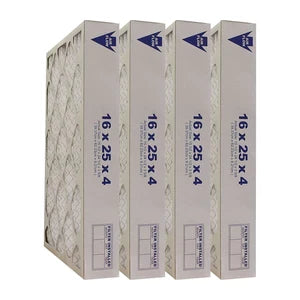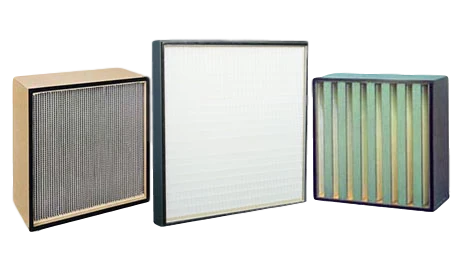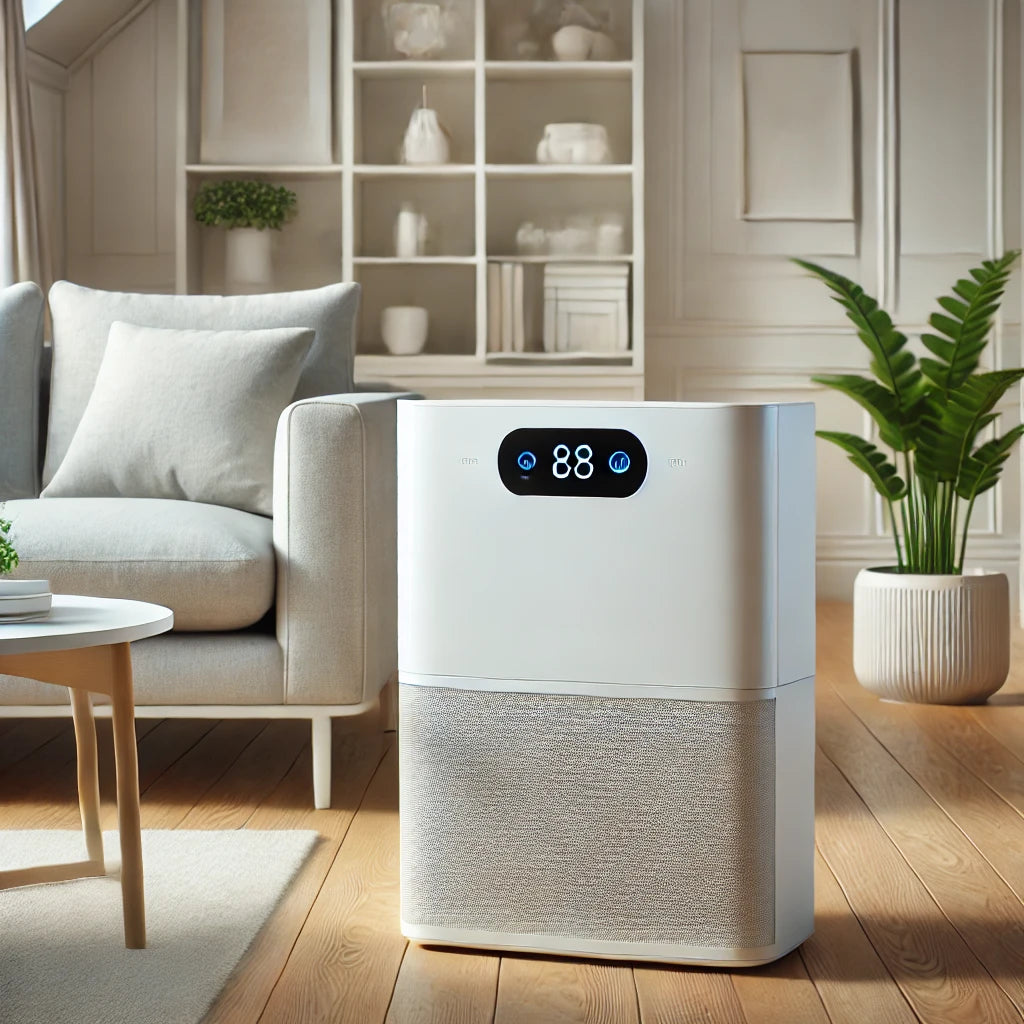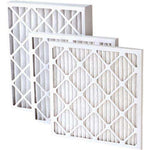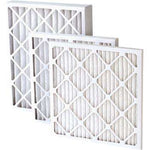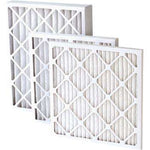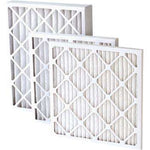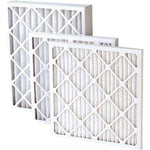You have no items in your shopping cart.
Introduction
As temperatures drop and snow begins to fall, we retreat indoors to enjoy the warmth and comfort of our homes. While winter brings the joy of hot cocoa and cozy fires, it also poses challenges for indoor air quality. Homes become sealed environments to conserve heat, trapping pollutants and allergens inside. One effective solution to maintain clean indoor air during these months is using High-Efficiency Particulate Air (HEPA) purifiers. This blog post explores why HEPA air purifiers are essential in the winter and how they can contribute to a healthier living space.
Why Indoor Air Quality Deteriorates in Winter
-
Reduced Ventilation: To keep the cold out, windows and doors remain closed, limiting the exchange of indoor and outdoor air. This can lead to a buildup of indoor pollutants.
-
Increased Use of Heating Systems: Furnaces and heaters can circulate dust and other particles that have accumulated in ducts and filters over time.
-
Indoor Activities: We spend more time indoors engaging in activities like cooking and burning candles or wood in fireplaces, which can release particulates into the air.
-
Humidity Levels: Dry winter air can exacerbate respiratory issues and increase the presence of airborne particles.
How HEPA Air Purifiers Can Help
HEPA air purifiers are designed to capture at least 99.97% of particles that are 0.3 microns in diameter. This includes:
- Dust and Dust Mites: Common allergens that can trigger asthma and allergy symptoms.
- Pet Dander: With pets spending more time indoors, dander levels can increase.
- Mold Spores: Moist environments from snow and ice can promote mold growth.
- Smoke and Combustion Particles: From fireplaces or cooking activities.
By removing these pollutants, HEPA air purifiers help maintain a cleaner and healthier indoor environment.
Benefits of Using HEPA Air Purifiers in Winter
-
Improved Respiratory Health: Reduces the risk of asthma attacks and allergy flare-ups by removing triggers from the air.
-
Enhanced Sleep Quality: Cleaner air can lead to better sleep by reducing nighttime allergy symptoms.
-
Reduced Spread of Illnesses: HEPA filters can capture bacteria and viruses, minimizing the spread of colds and flu.
-
Odor Elimination: Helps remove odors from cooking, pets, and other indoor activities.
-
Protection Against Outdoor Pollutants: Even though windows are closed, pollutants like pollen can still enter the home. HEPA filters help trap these particles.
Choosing the Right HEPA Air Purifier
When selecting a HEPA air purifier for your home, consider the following factors:
- Room Size: Choose a unit appropriate for the size of the room to ensure effective purification.
- True HEPA vs. HEPA-Type Filters: True HEPA filters meet strict standards for particle removal, while HEPA-type filters may be less effective.
- Noise Levels: If the unit will be used in a bedroom or living area, look for models with quiet operation.
- Maintenance Requirements: Consider the cost and frequency of filter replacements.
- Additional Features: Some models offer features like activated carbon filters for odors or UV lights for killing bacteria and viruses.
Maintenance Tips for Optimal Performance
- Regular Filter Replacement: Follow the manufacturer's recommendations for filter changes to maintain efficiency.
- Keep the Unit Clean: Wipe down the exterior and clean the vents to prevent dust buildup.
- Proper Placement: Position the purifier where air can circulate freely, away from walls and furniture.
- Monitor Air Quality Indicators: Many purifiers have sensors that indicate when air quality is poor, helping you adjust settings as needed.
Frequently Asked Questions
-
Can a HEPA air purifier help with winter allergies? Yes, HEPA air purifiers can remove common indoor allergens like dust mites, pet dander, and mold spores, reducing allergy symptoms.
-
How often should I replace the HEPA filter? Typically, HEPA filters should be replaced every 6 to 12 months, but it's important to follow the manufacturer's guidelines. Find our HEPA Filters here.
-
Do HEPA air purifiers remove viruses? HEPA filters can capture particles the size of many viruses, but no air purifier can guarantee complete removal of all viruses from the air.
-
Is it expensive to run an air purifier continuously in the winter? Most modern air purifiers are energy-efficient. Check the unit's energy usage; running costs are generally low, similar to operating a light bulb.
-
Can I use a humidifier with my HEPA air purifier? Yes, using a humidifier can add moisture to dry winter air, and when used alongside an air purifier, can enhance overall indoor air quality.
Conclusion
Investing in a HEPA air purifier during the winter months is a proactive step toward ensuring a healthy indoor environment. With the increased time spent indoors and the natural buildup of pollutants, a HEPA air purifier can significantly improve air quality, leading to better health and comfort for you and your family. Breathe easier this winter by making clean air a priority in your home.
Introduction
As temperatures drop and snow begins to fall, we retreat indoors to enjoy the warmth and comfort of our homes. While winter brings the joy of hot cocoa and cozy fires, it also poses challenges for indoor air quality. Homes become sealed environments to conserve heat, trapping pollutants and allergens inside. One effective solution to maintain clean indoor air during these months is using High-Efficiency Particulate Air (HEPA) purifiers. This blog post explores why HEPA air purifiers are essential in the winter and how they can contribute to a healthier living space.
Why Indoor Air Quality Deteriorates in Winter
-
Reduced Ventilation: To keep the cold out, windows and doors remain closed, limiting the exchange of indoor and outdoor air. This can lead to a buildup of indoor pollutants.
-
Increased Use of Heating Systems: Furnaces and heaters can circulate dust and other particles that have accumulated in ducts and filters over time.
-
Indoor Activities: We spend more time indoors engaging in activities like cooking and burning candles or wood in fireplaces, which can release particulates into the air.
-
Humidity Levels: Dry winter air can exacerbate respiratory issues and increase the presence of airborne particles.
How HEPA Air Purifiers Can Help
HEPA air purifiers are designed to capture at least 99.97% of particles that are 0.3 microns in diameter. This includes:
- Dust and Dust Mites: Common allergens that can trigger asthma and allergy symptoms.
- Pet Dander: With pets spending more time indoors, dander levels can increase.
- Mold Spores: Moist environments from snow and ice can promote mold growth.
- Smoke and Combustion Particles: From fireplaces or cooking activities.
By removing these pollutants, HEPA air purifiers help maintain a cleaner and healthier indoor environment.
Benefits of Using HEPA Air Purifiers in Winter
-
Improved Respiratory Health: Reduces the risk of asthma attacks and allergy flare-ups by removing triggers from the air.
-
Enhanced Sleep Quality: Cleaner air can lead to better sleep by reducing nighttime allergy symptoms.
-
Reduced Spread of Illnesses: HEPA filters can capture bacteria and viruses, minimizing the spread of colds and flu.
-
Odor Elimination: Helps remove odors from cooking, pets, and other indoor activities.
-
Protection Against Outdoor Pollutants: Even though windows are closed, pollutants like pollen can still enter the home. HEPA filters help trap these particles.
Choosing the Right HEPA Air Purifier
When selecting a HEPA air purifier for your home, consider the following factors:
- Room Size: Choose a unit appropriate for the size of the room to ensure effective purification.
- True HEPA vs. HEPA-Type Filters: True HEPA filters meet strict standards for particle removal, while HEPA-type filters may be less effective.
- Noise Levels: If the unit will be used in a bedroom or living area, look for models with quiet operation.
- Maintenance Requirements: Consider the cost and frequency of filter replacements.
- Additional Features: Some models offer features like activated carbon filters for odors or UV lights for killing bacteria and viruses.
Maintenance Tips for Optimal Performance
- Regular Filter Replacement: Follow the manufacturer's recommendations for filter changes to maintain efficiency.
- Keep the Unit Clean: Wipe down the exterior and clean the vents to prevent dust buildup.
- Proper Placement: Position the purifier where air can circulate freely, away from walls and furniture.
- Monitor Air Quality Indicators: Many purifiers have sensors that indicate when air quality is poor, helping you adjust settings as needed.
Frequently Asked Questions
-
Can a HEPA air purifier help with winter allergies? Yes, HEPA air purifiers can remove common indoor allergens like dust mites, pet dander, and mold spores, reducing allergy symptoms.
-
How often should I replace the HEPA filter? Typically, HEPA filters should be replaced every 6 to 12 months, but it's important to follow the manufacturer's guidelines. Find our HEPA Filters here.
-
Do HEPA air purifiers remove viruses? HEPA filters can capture particles the size of many viruses, but no air purifier can guarantee complete removal of all viruses from the air.
-
Is it expensive to run an air purifier continuously in the winter? Most modern air purifiers are energy-efficient. Check the unit's energy usage; running costs are generally low, similar to operating a light bulb.
-
Can I use a humidifier with my HEPA air purifier? Yes, using a humidifier can add moisture to dry winter air, and when used alongside an air purifier, can enhance overall indoor air quality.
Conclusion
Investing in a HEPA air purifier during the winter months is a proactive step toward ensuring a healthy indoor environment. With the increased time spent indoors and the natural buildup of pollutants, a HEPA air purifier can significantly improve air quality, leading to better health and comfort for you and your family. Breathe easier this winter by making clean air a priority in your home.
